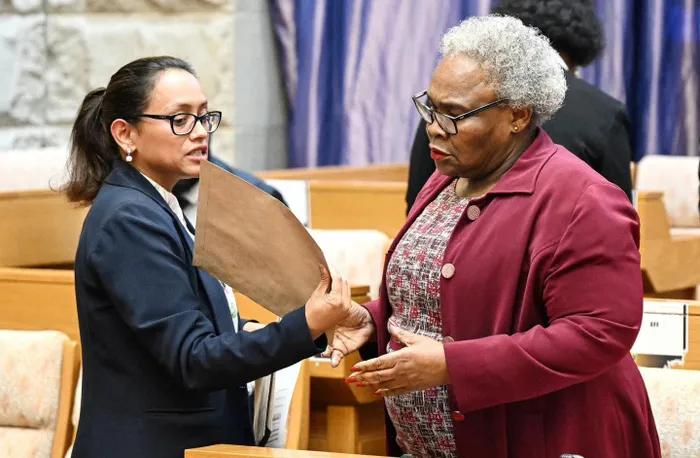New biometric system aims to reduce social grant fraud in South Africa

Social Development Minister Sisisi Tolashe chats to DA MP Alexandra Abrahams during a meeting of the portfolio committee in Parliament.
Image: Parliament of South Africa / Facebook
The South African Social Security Agency (Sassa) is set to implement mandatory biometric enrolment for new beneficiaries beginning in September.
This initiative is designed to enhance beneficiary verification processes and tackle social grant fraud, as emphasised during a recent briefing to the Portfolio Committee on Social Development.
The National Treasury estimates the project will cost R105 million over the next three years in its 2025 Budget Estimate of National Expenditure.
Acting CEO Brenton van Vrede said they began piloting the biometric system at the start of the 2025/26 financial year after challenges with unions were addressed.
Van Vrede said some issues were experienced during the pilot phase, but these were ironed out.
Social Development Minister Sisisi Tolashe indicated that Sassa requested the National Treasury to appoint contract workers to fast-track the project and ease the tension and anxiety of beneficiaries.
Tolashe also said the implementation of the biometric identification was an outcome of the outcry by MPs and the Auditor-General that social grants were paid to the wrong people.
But MPs questioned the implementation of the project insofar as providing resources to staff and whether it would not contribute to long queues.
DA MP Alexandra Abrahams said not all officials in Sassa offices have their own fingerprint scanners.
She noted that many Sassa offices don’t even have self-help kiosks and flat screens that were part of the queue management system.
“So my question then is how is this going to affect the long queues we are seeing?” Abrahams asked.
Van Vrede referred to a response that was provided by CFO Tsakeriwa Chauke when he spoke about using the savings from the terminated Master Service Agreement with Postbank towards the modernisation and digitisation programme at Sassa.
Chauke earlier told the MPs that they were not allocated additional funds for the project.
He said the savings would come in handy to hire contract workers, used in the digitisation of the documents, maintenance of offices and infrastructure to service beneficiaries, as well as beefing up cyber-security measures.
“We are also looking to acquire some of the gadgets that are required because, if you do the modernisation, you are going to require a lot of gadgets that could be different from what we are operating. We are also looking at the review of the ICT architecture, just to make sure that we support this,” Chauke said.
Get your news on the go, click here to join the Cape Argus News WhatsApp channel.
Cape Argus